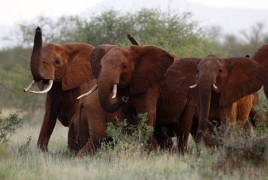
A research team exploring what's known as "junk" DNA in mammals discovered the gene believed to be responsible for elephants' low cancer rate and found that it's in humans as well, The New York Daily News reports.
It's known as p53, and it occurs in great abundance within enormous animals, suppressing tumors at a rate that leaves only one in every 20 elephants with cancer while humans contract the disease at a rate of one in five, the researchers at the University of Utah said. Elephants have 40 copies of p53 while humans have only one.
"Junk" DNA is DNA that doesn't code for proteins — what the building blocks of our lives are made up of — but it may have other functions, as some studies have noted, like controlling when genes are expressed, the study, published in Cell Reports, explains.
"People used to call the noncoding regions 'junk DNA,' but I see it as a jungle that has not been explored," neurobiologist Christopher Gregg, a co-author of the study, told the UNews. "We are exploring the noncoding regions to try to discover new parts of the genome that might control different diseases."
Three more genes were found while the team scanned the elephant genome for mutation-resistant elements — FANCL, VRK2 and BCL11A — all of which protect the cells of the body from mutating into tumors. Unfortunately, the human versions of these same genes don't protect us from cancer the way they do our long-trunked friends. But that doesn't mean that more can't be learned about how those genes could be manipulated within people with the hope of a similar outcome.

